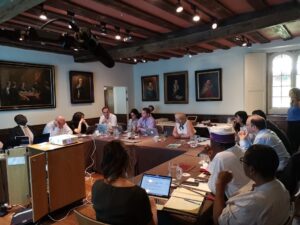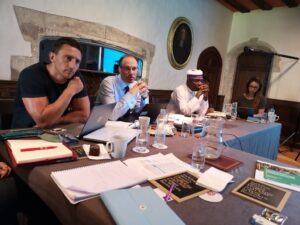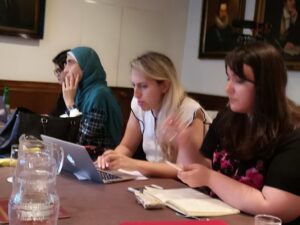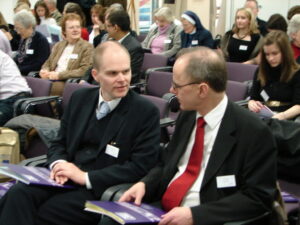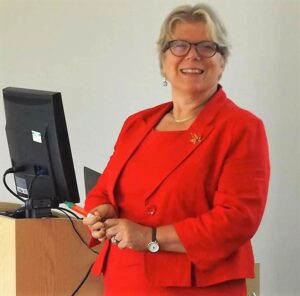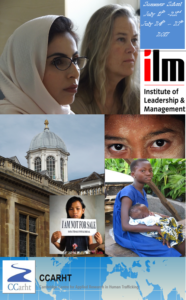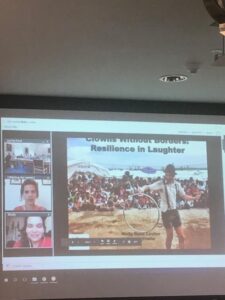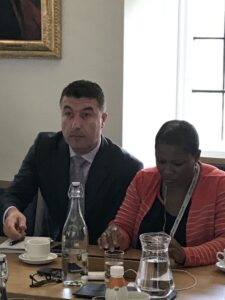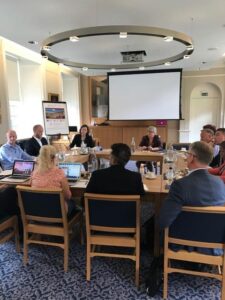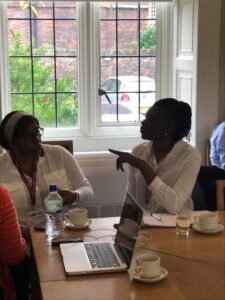Revd Dr. Carrie Pemberton Ford
Publications – the back catalogue of Dr Ford’s work on Human Trafficking, Modern Slavery, Forced Migration and Integration challenges
Phase 1 – Dr Ford’s work up until 2012 – Not for Sale and capacity building of Safe Housing deploying Faith Based Resources in the community for the common good.
Phase 2 – Dr Ford’s work post 2013 – the establishment of the annual CCARHT Symposium, the CCARHT International network, key publications, speaking and capacity building events with the Academy, businesses, policy makers, churches, FBOs and CSOs.
Get in touch secure Dr Ford as a speaker for your conference, chair for your panel or evaluation team or to design a strategic planning/ training and implementation day.
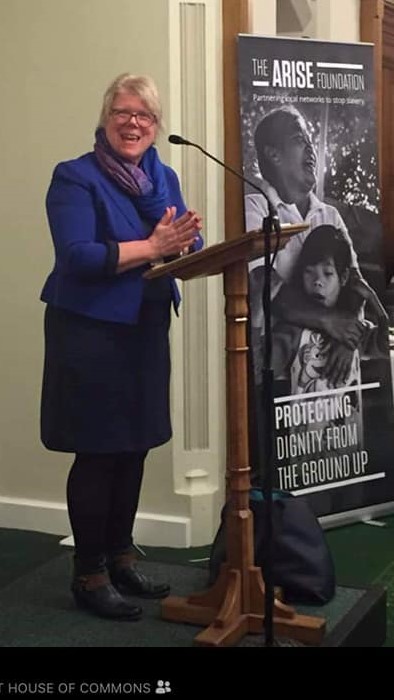
Phase One
Phase one – Campaigning and identification: the years before the Modern Slavery Act.
Dr Ford founded the UK intervention ‘Not for Sale’ advocacy movement in 2002, which brought the realities of not only Sex Trafficking but also as the campaigning moved forward and a wider range of ‘victims’ surfaced the wider incursions of trafficking into the agricultural, food processing and construction industries – which had been designated by the International Labour Office as ‘forced labour’ and within a few years became designated labour trafficking.
The campaign was referenced in Hansard as one of the last and most effective pre-social media advocacy campaigns, bringing to the attention of all parliamentarians, through a grass roots cross-party campaign in 2004, asking the following critical question. The campaign was later supported in a range of creative arts initiatives, with a campaign anthem ‘Love’s Not for Sale’, in publishing, Not for Sale, Raising Awareness and Ending Exploitation, and the Real Scandal of Sex Trafficking, and in a commissioned drama brought to the Edinburgh fringe.
The priority of Safe Housing and Reliable Victim Protection With the UK ratification of the Palermo Protocol, in 2006, and the first steps of absorbing the protocol into legislation starting to be worked out through the courts and a designated unit within the Crown Prosecution Service under the leadership of former CCARHT director Glynn Rankin, Dr Ford turned her attentions to building the capacity of the Faith Based sector in providing social protection and first base ‘safe housing’ for those being ‘surfaced’ by police interventions most notably in operations Pentameter one and two, in 2005 and 2006.
The winter of 2006, saw the second phase of UK Not for Sale activity from CHASTE with a second powerful campaign into Westminster with the Timefor@rest campaign. With the UK ratification of the Palermo Protocol, and the first steps of absorbing the protocol into legislation and building policing capacity in the UKHTC achieved in 2006, the requirement for safe housing was pressing. The Home Office had allocated all of its safe housing budget – so Dr Ford galvanised the Faith Based sector to develop appropriate social protection and first base ‘safe housing’ for those being ‘surfaced’ by police interventions and the emerging field of NGO first responders. The Timefor@rest campaign, won wide support in lobbying for the UK Government to sign up to and adopt the Council of Europe Action on Trafficking in Human Beings, which the Blair government duly did in 2007/2009.
Government and Shadow Government ministers were briefed by Dr Ford on the requirements and ‘care deficit’ in counter trafficking work, the campaign won wide support in lobbying and enabled with the efforts of other campaigning groups such as ECPAT and the Poppy Project, saw the essentials of the convention of the Council of Europe Action on Trafficking in Human Beings installed across legislation and provision of required services coming into being 2007/2009. This provided much of the legal sub-structure for requirements around Prevention, Prosecution, victim Protection and Partnership work in place today.
Having successfully established the work of the Churches Alert to Sex Trafficking across Europe in 2004 calling for faith communities to be pro-active in addressing the immediate need of victim/survivors of trafficking to have a secure and restorative place of safety, whilst governments in source and destination countries were slow in responding with dedicated budgets. This pro-active stance energised a number of religious communities in the UK and Europe to assemble resources to enable the supply of houses and trained personnel to assist in the vital initial stages of survivors’ psychological and physiological recovery.
In 2011 the Salvation Army , one of the early members of the CHASTE Round Table on housing, was selected by the UK Government to be the National Human Trafficking Victim Care and Coordination of safe housing Contractor. It currently deploys scores of independent safe house providers, standing on the shoulders of the early day network of NGO and FBO safe houses, (2002 – 20011) which had emerged during these important years, and provided a great deal of the model culled from across Europe of safe housing, and essential psychological support. The contract was initially a modest six million pound sterling for three years, a contract successfully renewed in 2015 till 2019.
The impact which a Government shift of contract occasions – as in the ultimate demise of the Poppy project based out of the London based Eaves Housing working with Trafficked women for the past decade, is a matter for ongoing public/private/ third sector analysis and consideration of the risks and rewards of working with government contracts. The quest for how to achieve sustainability beyond the multi million pound contracts, and retain integrity of voice for survivors and victims within such contracts when working as the nominated Government contract holder is just one of the highly contested and significant areas of policy consideration, which CCARHT is now developing in its recent work with the Judge Business School and the Cambridge Centre for Social Innovation.
Dr Ford had spent several years working directly in first responder, and protection work in particular Phase one of the work against Human Trafficking in the UK and in Europe. She was the founder and CEO of the CHASTE round table – Churches Alert to Sex Trafficking Across Europe, which successfully doubled the national provision of safe beds available in dedicated safe houses within the first eighteen months of its activities in the UK.
The step forward for the Salvation Army, as one of the ‘activated’ four partners around the CHASTE round table (the Medaille Trust, Women at the Well, the Salvation Army, and Housing 4 Women) in securing the Government contract to manage the newly established National Referral Mechanism requirement for safe accommodation, with the initial Government funded contract of minimal support of 45 days safety (accommodation, essential counselling, health services, and accompanying services) has been significant for the national extension of safe housing in the UK, as well as securing the international voice provided by faith based organisations in their response to trafficking, particularly in relation to concentrating on responsibly resourced victim protection and onward recovery, and care beyond repatriation.
It was clear from the earliest pieces of work undertaken by Dr Ford, whether in harnessing the spare ‘built’ capital that were made available from the Religious Congregations to supply the first Faith Based Organisation (FBO) Safe Houses recruited through the CHASTE round table on Safe Housing and then ‘Kite marked’ for appropriate deployment by the various Police operations where safe housing space for potential victims of trafficking was vital.
These initial years of work saw the FBO houses being directly subsidised, NOT by the central Government exchequer which is now in place for safe housing support, but through the generation of charitable funds from Religious Congregations themselves, (the Medaille Trust under the pioneering leadership of Sister Anne Joseph) and the Salvation Army (pioneered under the championing of Commissioner Helen Clifton) ; any who brought capacity in the first couple of years of activity from 2003 – 2005 had come around the CHASTE round table to offer their initial bespoke services for ‘hospitality’, ‘protection’ and initial recovery. It was a tough ask for the denominations, and not all were ready to respond with housing stock. Notwithstanding in the first three years of activity the accommodation made available for the National safe ‘housing’ for potential victims of trafficking had been doubled, at virtually no cost to the Home Office.
This courageous, pioneering work by the first generation of safe housing pioneers across the Faith Based Organisations, has yet to be properly honoured, or indeed sociologically decompressed in terms of the way in which activating FBOs can inject fresh motivation and political impetus for the incorporation of significant Human Rights based legislation, and assist in the immediate calibration and activation of compassionate civil society responses.
European Learning on Faith Based Organisation contributions.
Dr Ford was a member of the Churches Against Trafficking in Europe specialist team convened by the Churches Commission on Migrants in Europe (CCME) with a DG Home (Daphne Fund) grant, with colleagues in Romania, Lithuania, Latvia, Ukraine, Moldavia, and Germany, which started exploring these inter-connections in (2004- 2006).
There had been significant action across churches in Europe in the years running up to the turn of the millennium, particularly evidenced amongst the Religious Congregations in Italy led by the pioneering Sister Eugenia Bonetti, whose work has been rewarded in the last decade by a number of formal awards from both the Vatican and from the Italian State. A Consolata religious sister, her eyes were first opened to the emergence of a Nigerian dimension to global trafficking when she returned from ‘missionary teaching’ in Africa to Turin, and discovered young Nigerian females being exploited in number on the roadsides of Turin in the late 1990s.
A training day organised by Dr Ford in 2005 to explore the issues emerging amongst the Nigerian diaspora in Europe – and the Human Trafficking links which were being manifested – was supported with assistance with the training facility of the Princess Diana Memorial Fund.Sister Eugenia Bonetti attending the CHASTE convened 2005 training day addressing trafficking in the diaspora churches held at the Princess Diana Conference rooms in London.
There are issues yet to be fully discoursed in their potential humanitarian provision and cultural persuasive power, bearing in mind proper secular concerns around potential for proselytisation, the imposition of internal ethical red-lines not aligning with host or return cultures, and the potential for a lack of transparency for inter-governmental co-operation and law enforcement probity with alternative international organisational networks being deployed. These are some of the areas which CCARHT in its work with faculties of Divinity, Sociology, Business and Faith Based Organisations internationally is bringing into consideration for thought leadership in the fast moving multi-agency matrix of counter trafficking responses in the first decades of the twenty first century.
Steps forward in Enforcement
During 2005 -2007 Dr Ford worked with Gloucestershire police chief, Chief Constable Dr Tim Brain, as a member of the Gold Steering group, to develop the pioneering National Police financed operations to ‘lift the stone on trafficking in the UK’ Operations Pentameter one and two – which began the journey of National Policing and the Home Office in starting to understand the complexity and range of Human Trafficking present in the towns, and cities of the UK, with criminalised networks being supplied across Europe and reaching deep into Africa, Asia, the Balkans, the Middle and Far East as well as closer to home.
In 2006 Dr Ford had become one of the five founder board members of the UK Human Trafficking Centre. There she met fellow Director of CCARHT, Grahame Maxwell when UK national Police lead for counter trafficking and migration crime, and founding Director of the UKHTC at its initial headquarters in South Yorkshire. That year saw the initial convening of the UK wide national network for research and training under the leadership of UKHTC, chaired by Dr Ford with some of the future University researchers still present in the academic engagement field in the UK around the table.
With work being undertaken with a number of police forces, including Cambridgeshire Constabulary, Norfolk Constabulary, the Metropolitan Police Service dedicated Trafficking Unit, Gloucestershire Constabulary, and the Gang Masters Licensing Authority (now the Gang Masters and Labour Abuse Authority GLAA), Dr Ford became aware of the pressing need for focused informationals to be made available for a range of ‘potential victim service users’.
Innovation
There were through the years of Pentameter one and two, a number of victim/survivors of trafficking abuse who were being ‘apprehended’, ‘surfaced’ or ‘encountering’ law enforcement, in ‘brothel’ raids, searches instigated by information received from NGOs working in the field, and routine ‘houses of multiple occupation’ visits. The Ibix Translate tool was born. The first of its kind, with 200 ipods donated by APPLE, loaded up with informationals in 12 top languages of identified communities at risk, the tool was initially deployed by the Metropolitan counter Trafficking Unit, and operations master-minded through the UKHTC in Sheffield following Pentameter one. The innovation was showcased at the UN GIFT conference in 2007 by Dr Ford, and successfully demonstrated in a panel dedicated to deploying technology in the fight against trafficking and enhanced protection of victims. The Austrian Police force showed interest and worked forward independently with the UN in its Vienna headquarters with its protection and trust building capabilities. and has since been absorbed into the UN portfolio of tools for border forces and the first wave of next intervention is being trialled in Refugee Camps internationally – the UN VITA tool (in 2006).
The second generation UN VITA tool adds to the portfolio of tools available for border police to deploy to increase significantly the co-operation and agency for potential victims of trafficking pertinent knowledge around personal safety, potential choices and ‘pathways’ open to those being interviewed by enforcement teams, whether arising from issues with their immigration status, or early indications of their being ‘trafficked’.
Other interventions in phase one undertaken by Dr Ford as she headed up the work of CHASTE in driving forward advocacy and ministerial briefing to encourage the full integration of the Palermo Protocol and the Council of Europe Convention on Action Against Human Trafficking into the UK political, policing and civil society landscape included:
- The development of the Ibixtranslate informational tool for potential victims of trafficking in 2006. This was developed with a small grant from the UKHTC, utilising the first wave of Apple Mp3 ipods and deployed by the Metropolitan Police counter trafficking unit, as well as in the second phase of Operation Pentameter.
- The initial NOT FOR SALE movement in 2003 – which brought forward to parliament the requirement for a strong integration of Palermo Protocol requirements into national legislation.
- The commissioning of two dramas, both featuring at the Edinburgh Festival on forced migration and Human Trafficking: 2007 and 2008.
- A national tour rolled out across Anglican Cathedrals of the UK, engaging public audiences through art, speech, film and song on the challenge which Human Trafficking now presented for social justice, addressing gender based violence, labour exploitation and human rights in contemporary UK culture 2008. The Not for Sale Tour.
- Initial ‘Kite marking’ of safe housing being developed through the intervention of the CHASTE round table for Safe Housing, by Religious Congregations and Faith Based Organisations in order to create a sustainable and quality controlled level of safety in responding to the needs of survivors in co-operation with the Poppy Initiative of Eaves Housing.
- The innovation of the Research and Education forum from the UKHTC initiating contact between concerned academics, and UK policing.
- Inaugurated the first NOT FOR SALE Sunday in 2005 – presaging the later adoption of St Bakhita’s day by the Roman Catholic congregations at the request of Pope Francis in 2015 – held every February 8th, and Freedom Sunday which was put into play by Protestant Churches in the USA.

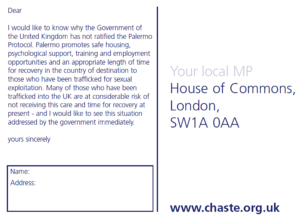
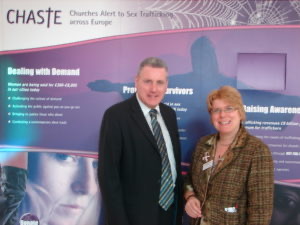
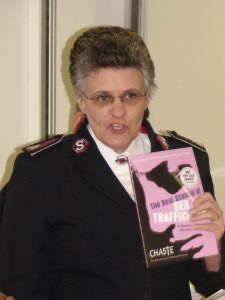
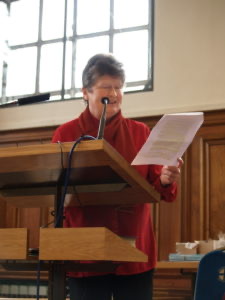
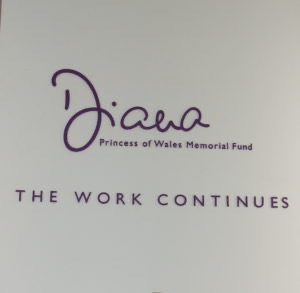
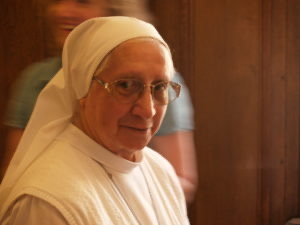
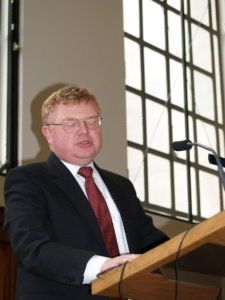

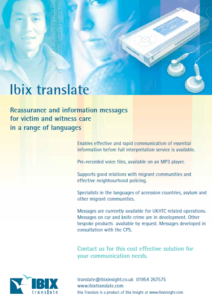
Phase Two
Symposia
Since 2015 Dr Ford has been developing CCARHT Symposia on Human Trafficking and Modern Slavery in Cambridge as well as building co-operation with a number of Universities.
The University of Palermo and the Annual Symposium at the Democracy, Migration and Human Rights Symposium held in Palermo, Sicily every June co-operating since 2017.
The American University in Bucharest – the Sustainable Development Goals and Human Trafficking mitigation. 2018
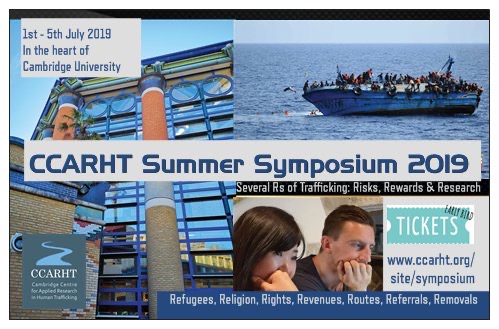
The CCARHT summer symposia has been hosted in the University of Cambridge since 2016 – see our events page
2016 – Developing a #2020 vision on Human Trafficking
Jesus College University of Cambridge
2017 – Children in focus – Human Trafficking and Modern Slavery St Catherine’s College University of Cambridge.
2018 – The Five Ts of Trafficking: Trauma, Transport, Terror, Tech and Transparency. Jesus College University of Cambridge
2019 The Several Rs of Modern Slavery: Risks and Rewards, Remittances, Rights, Religion, Rule of Law, Refugees, Routes, Removal, Regulation. The Judge Business School University of Cambridge (July 2019)
Appointments
In 2013 – 2015 Dr Ford was a Research Associate at the Free University Orange Free State Republic of South Africa working with Professor Beatri Krueger in the Faculty of Law.
In 2016 – 2017 Dr Ford worked with the United Nations Institute of Training and Research (UNITAR) with a UNITAR Research Fellowship – working with specific attention to Gender Based Violence, Human Trafficking risks within Migratory flows and in Peace Keeping Operations, and consulted with a number of UN departments on these areas of concern – including a High Level Panel convened in the Balkans by NATO.
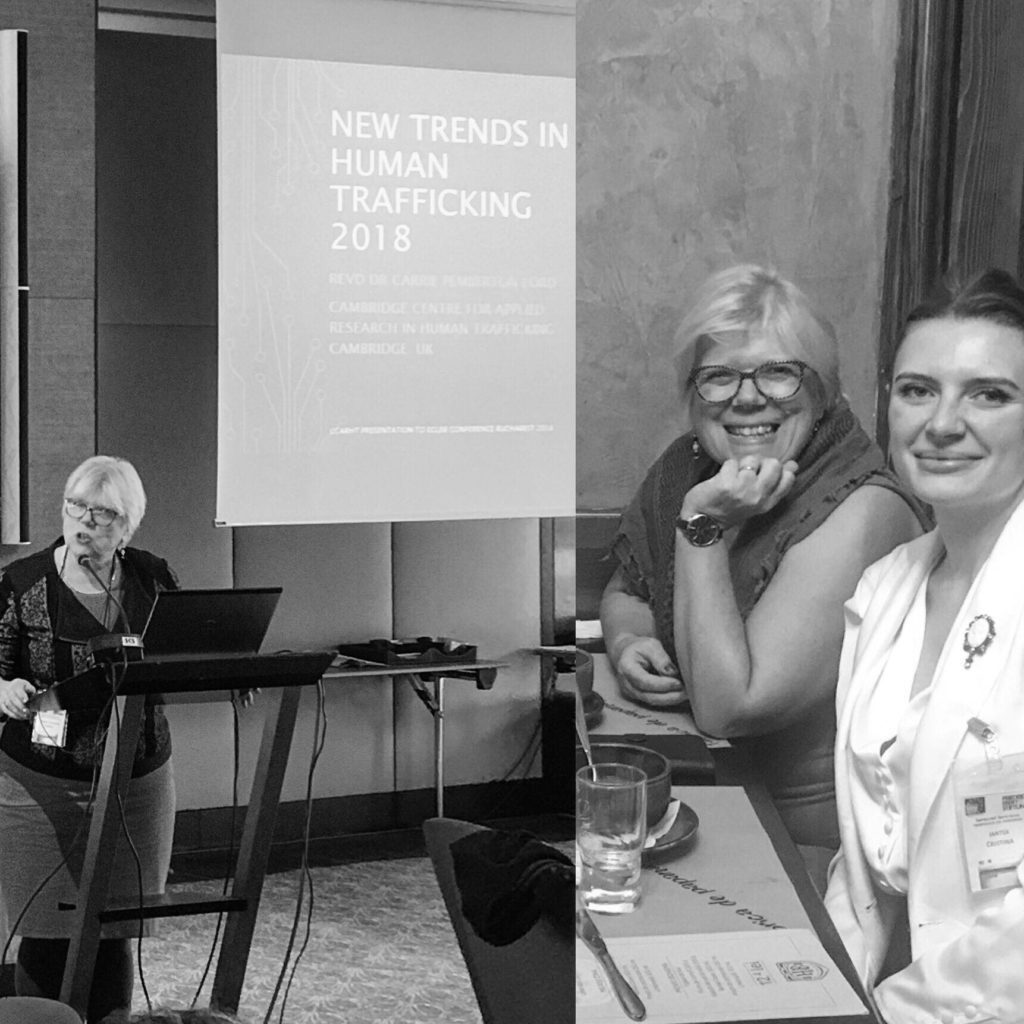
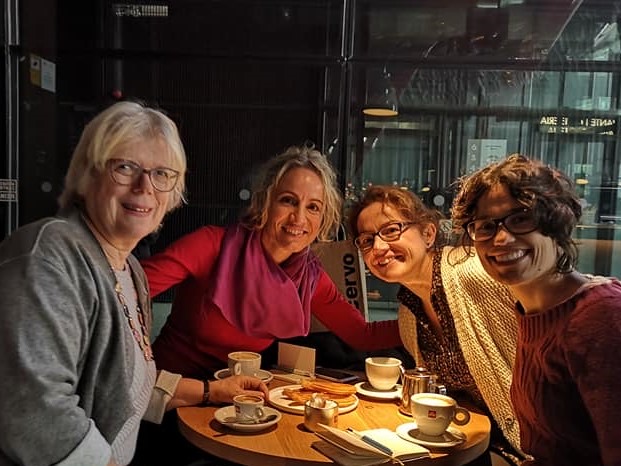
Working on a new Film commission with Spanish colleagues, during a short stop over in Madrid 2018.
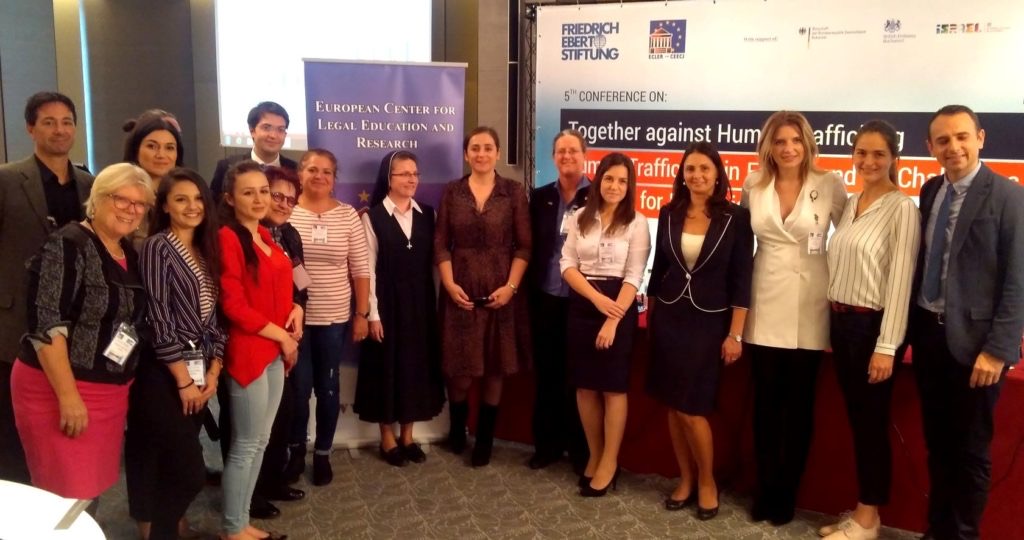
Speaking
Dr Ford runs a full speaking diary across the year, and is available to be brought into symposia, conferences and open research days to both facilitate strategic thinking and resource teams with some of the latest thinking developing in their area of concern, as it addresses Human Trafficking and Modern Slavery. For more information on Dr Ford’s availability please ‘contact at ccarht.org’ with speaker request in the subject line.
Most recently Dr Ford launched the 2019 CCARHT RENATE report at the Houses of Commons sharing the platform with the Chair of the Modern Slavery Review committee the Rt Hon Maria Miller, the founder of the Centre for Social Justice and former leader of the UK Conservative Party, the Rt Hon Iain Duncan Smith and the former Commissioner of the Metropolitan Police Service Lord Hogan Howe.
Some of the many speaking requests with papers prepared fulfilled in 2018 – 2019:
- the Romanian Police Force annual conference – Constanza Romania;
- SDGs and Trafficking mitigation, the American University, Bucharest Romania;
- “Together against Human Trafficking” the Konrad Adenauer Foundation, International Justice Mission working with their NGO network, Berlin;
- ‘Seven Country mapping of risks to minors of Human Trafficking across Europe’, RENATE Religious Congregations working against Human Trafficking London;
- the PHIT conference (Psychological Health Impacts of Trafficking – from victimology to survivor-centric responses) University of Barcelona;
- the Clewer Initiative – the Anglican Church’s initiative against Human Trafficking – ‘Faith Based Organisations working in Counter Trafficking lessons from the first decade since Palermo’, Bristol Cathedral UK
- ‘Adopting a Public Health approach to the ‘infection’ of Human Trafficking’ the University of Palermo, Sicily
- ‘Supply Chains and Transparency: exploring high tech exposure’ with CCARHT and Just SHARE – London.
- ‘Chain Reactions – political repercussions and security risks entailed in Mass Migration through the Balkans 2015’ NATO High Level consultation – North Macedonia.
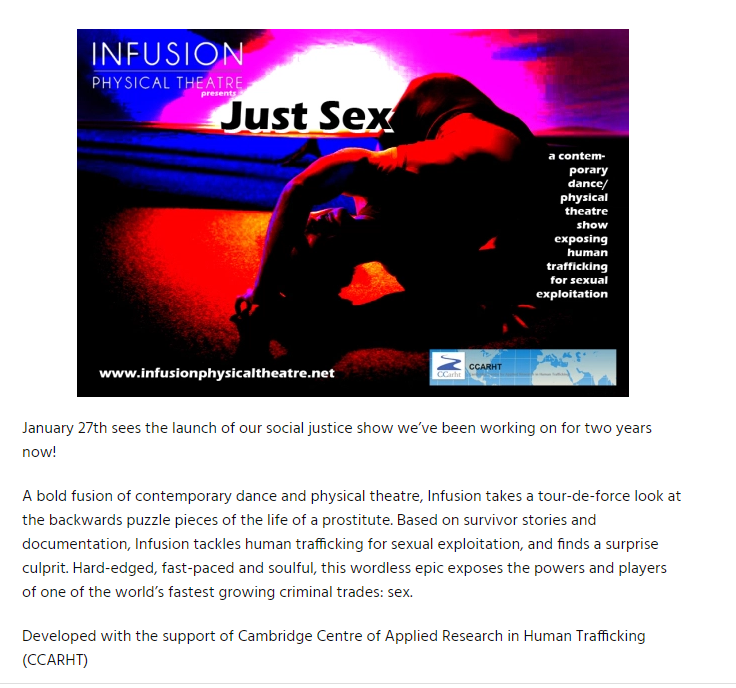
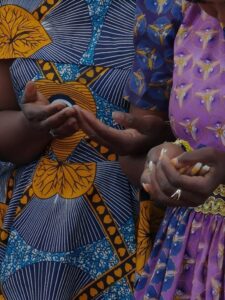
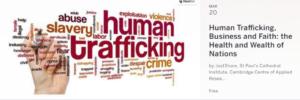
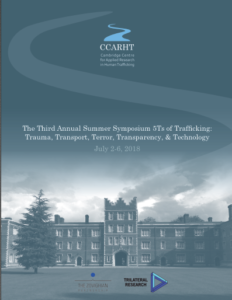
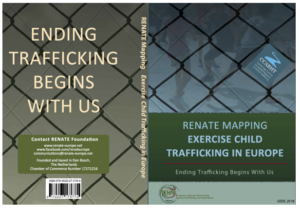
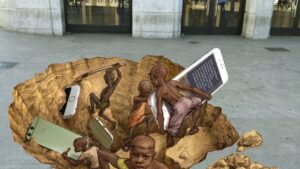
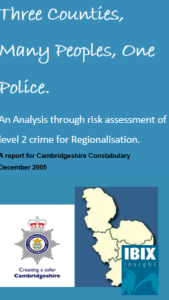
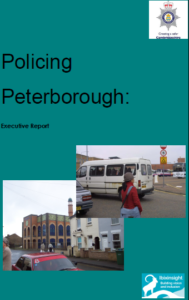
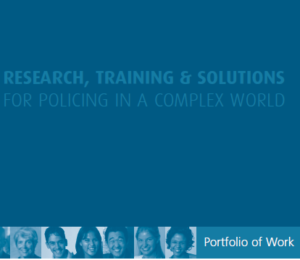

And a final spot of joining up some dots: Faith Communities and Social Justice
- Circle Thinking: African Women Theologians in conversations with the West (issues of GBV, Culture and Human Rights discourse, FGM, Post-Colonial rifts in theological dynamics, pre-Colonial discourses countering patriarchal mainstreaming) Brill 2002 Pemberton
- ‘Whose face in the mirror? Personal and postcolonial obstacles in re-searching Africa’s contemporary women’s theological voices’. Ed Ursula King and Tina Beattie New Studies in Religion and Gender. Concilium 2004.
- ‘Breaking the Silence: Speaking Holy Words for Women’ Gender Based Violence –social constructions and theological models – in L Orr MacDonald, Ed. Do Not Be Afraid, Scottish Churches Publishing, Edinburgh.
- Anglicanism A Global Communion – (a global conversation of different voices from the international communion featuring issues of gender, violence, and power alongside ecclesiology and mission) Mowbray 1998

